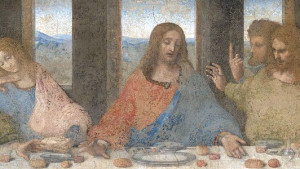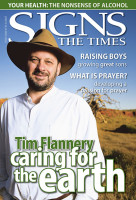We see many examples of unhealthy religion obsessed with some or other vision of the future. Living solely for the future can lead us on an exhausting trek of predicting or to a state of indifference toward the present.
But to abandon our vision of the future is no way to live well in the present. The way we live this life— that we can see and touch—is determined by what we believe about the mystery behind all of life, about the future, beyond our place and time.
Whether one is brutal, cynical, apathetic or gentle, constructive and alive, depends on one's view of the future.
Is our world and human experience a spark of light in the vast meaningless darkness that has come with a bang and will go away with a whimper? Or is our world and human experience a part of a great mystery of light, goodness and meaning that will last? Whether religious or not, our beliefs— or even mere hunches—about the future matter.
Discussion of the future in the Bible has been centred around the prophets— often misunderstood personalities of the ancient world. They were mystical and earthy, gracious and angry. We can hear the voice of the prophets in three ways.
First, we hear prophets as predictors, people God sent to help us see the supernatural origin of religion. Like fortune tellers, we hear prophets giving us insider knowledge to help us survive in the difficult times we fear are coming or to help us identify the correct way to go. This way of hearing the prophets can help us in times of suffering to have confidence that the ultimate reality of justice, goodness and meaning will prevail in the future. But it does little in helping us change the present.
Second, we hear prophets as social protesters. Rabbi Abraham Joshua Heschel describes prophets as those who, instead of taking us to the elegant mansions of God's mind, take us to the slums. Their impatience with injustice may strike us as hysteria, but this is because prophets feel fiercely.
A prophet sees and hears what God sees and hears at all times: cries of pain, tears of oppression, the agony of injustice.
While, as Heschel says, the rest of us have grown scales on our eyes, calmed our nerves and silenced our conscience, the prophets still feel what God feels. And for the prophets, the greatest cause of oppression is when injustice is organised and systematised, and then legitimised in social, political, economic, religious or educational systems. To the patriots, prophets were committing treason; to the pious they were blasphemous; and to those in power they were saboteurs. But regarding the prophets merely as social protesters is still an incomplete way of hearing their message.
The third way to hear prophets is as those God has sent to help us imagine and work on what the world can become. They not only protest our actions; they help us dream. They not only talk about “what is not” but “what can and must be.” Behind their austere and stinging words is compassion for people. The prophet Isaiah was sent to “strengthen the feeble hands, steady the knees that give way” (Isaiah 35:3).
The ultimate object of the prophet's life is the “dream of God” for our world and that's why their sayings are imbued with some of the most beautiful poetry in the ancient world. Far more radical than social protesting, their struggle was for us to change the ways we see each other, God, the world and everything in it. To them, we appear blind and deaf and their job is to wake us up to God's dream among us, to help us re-imagine.
Today, compassion has become strictly an individual virtue, not a sociopolitical affair that drove the prophets of old and Jesus Christ to be the revolutionaries they were. Instead of merely helping the victims, they insisted that compassion without justice meant quietly giving in to a system that creates ever more victims. Rather than “practising random acts of kindness,” these prophets practise the systematic dismantling of injustice.
The task of tackling injustice in the world seems so daunting that most of us retreat from it. To survive, we become numb, imagining that since suffering is not visible to us, it is not our responsibility. But we are interdependent with our human family, wherever they are.
While we think injustice in the world is hurting others but not us, we are oppressed by our own success, by consumerism that leaves us feeling inadequate, by broken relationships sacrificed for that same success, by isolation and loneliness, living in fear for our jobs, for our future, for our planet.
Something needs to be dismantled.
That's why grief is necessary. Through the prophets, God grieves—and we should grieve too. There is no dream of the future without grieving the losses of the past. We have to learn to grieve as a society, because without grieving we cannot leave the past ways and hope again. Abandoning our dreams of money, sex and power as an ultimate fulfilment for human life will take some grieving, but without grief, no new vision can emerge.
Each of us is called by God to make a choice. As the prominent thinker and activist Jim Wallis tells us, the real choice of our time is between cynicism and hope. Cynics are not irrational or na





